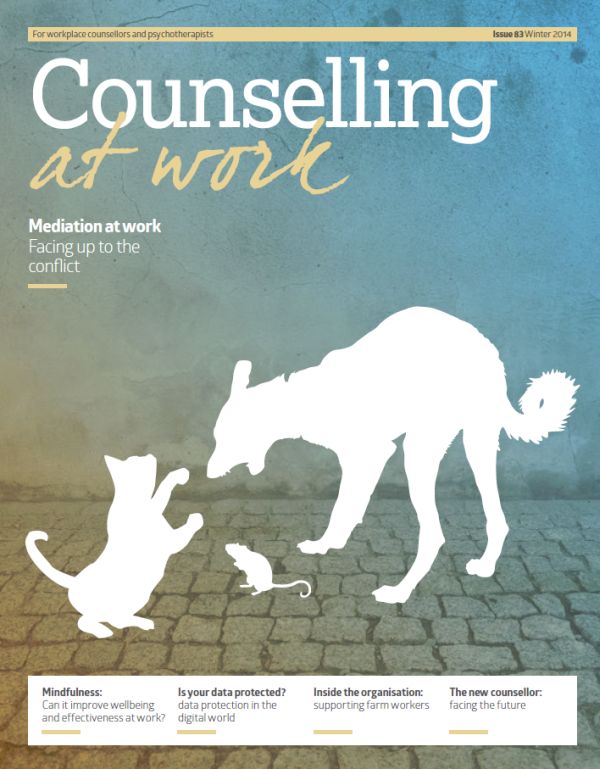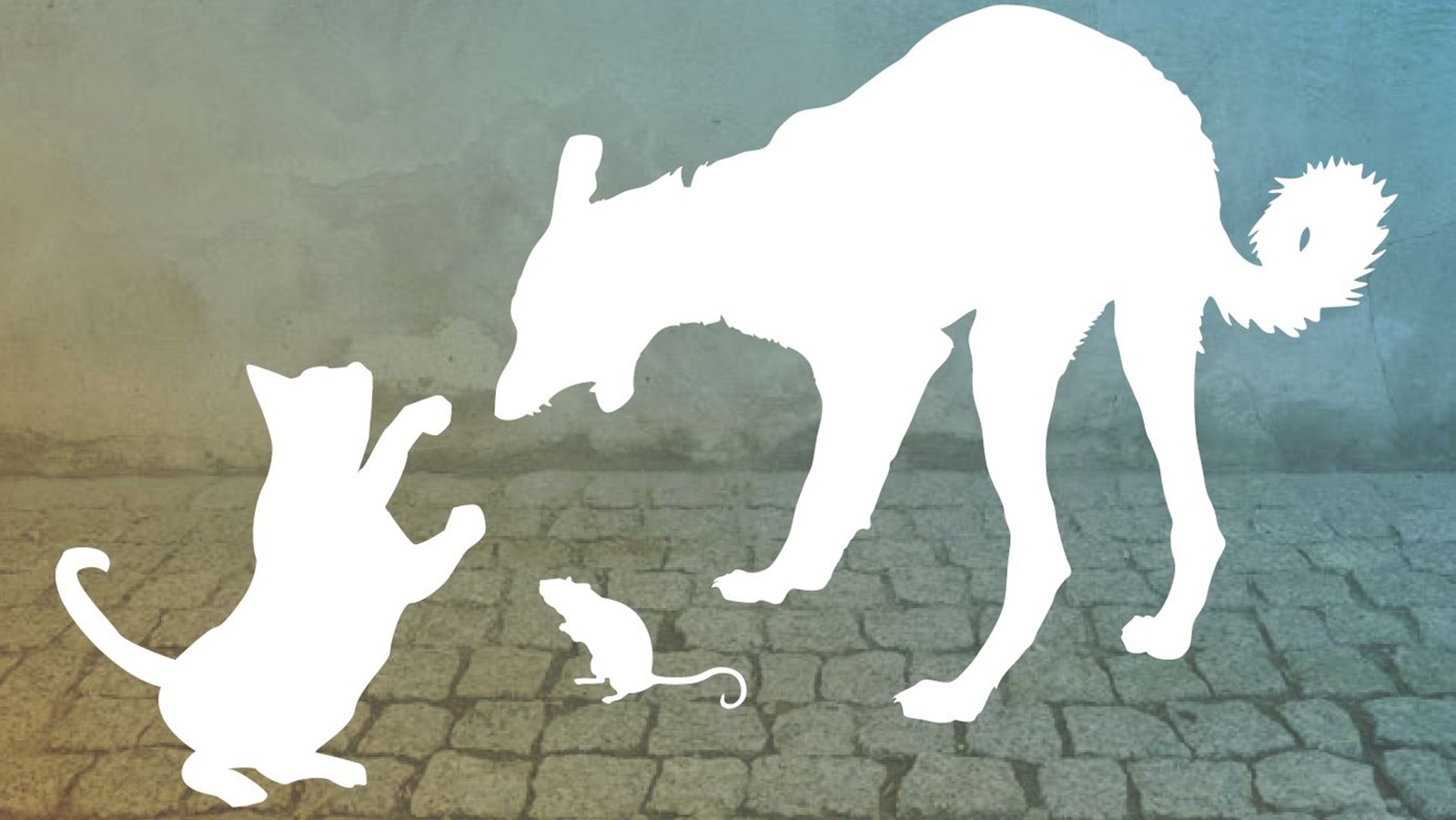In this issue
Features
Mediation: A service and practice journey
Angie Gaspar explains why her service adopted the transformative model of mediation
Working mindfully (free article)
Can mindfulness improve work-related wellbeing and work effectiveness? William Van Gordon, Edo Shonin, Katie Skelton and Mark Griffiths consider some of the recent findings
Data protection in a digital world
Andrew Kinder and Eugene Farrell review the proposed changes to data protection legislation and, advise counsellors on how best to meet the requirements
The new counsellor
Hilary Green concludes her reflections on the challenges of a new career
Regulars
The bigger picture
Lead Advisor Rick Hughes on the latest workplace news
Workplace matters (free article)
Dr Sandi Mann – the power of mediation
Cyberwork (free article)
Dr Kate Anthony – information overload
Inside the organisation
Charles Smith talks to Counselling at Work

A pdf of this issue is available in the Counselling at Work archive
First words
Mental health was much in the news as 2014 drew to a close. The message that I’m glad to hear repeated is that mental health needs to be given equal status with physical health. Norman Lamb MP, Minister for Care and Support, spoke about the moral and economic case for improving mental healthcare and challenged the UK’s biggest companies to sign up to ‘Time to Change’. He urged for more organisations to join and for employers to be leading the way in dealing with depression.
Increasingly clients arrive in the counselling room saying that talking therapies were recommended by their GP to help treat depression or because they sought an alternative to medication. But so often in organisations it is the other interventions that practitioners are involved in that support good mental health and which may also help to prevent or alleviate depression. This issue features articles on both mediation and mindfulness, two interventions which can play a role in reducing distress and improving employee wellbeing and engagement.
Welcome to Angie Gaspar who writes our cover article and leads an in-house counselling team and mediation service within an NHS Trust hospital. Angie writes that it was while undertaking a master’s in Work-based Learning and Mediation that she discovered an alternative approach to conducting mediation; one that focused far less on the mediator controlling the process and more on encouraging the parties in conflict to take control. Here she outlines the journey her service made to introduce the transformative model of mediation and why strong emotions cannot be avoided or ignored.
As we move into 2015, it seems likely that the buzz around mindfulness is set to continue. In her ‘Cyberwork’ column, Kate Anthony explores the current trend in reaching for the off switch, born out of a need to protect our frazzled brains from the impact of being constantly connected. Citing the recent appointment of Google’s Head of Mindfulness, Chade Meng Tan, Kate recommends that employees and organisations would be wise to take advantage of the current trend towards creating more emotionally healthy workplaces.
In ‘Working mindfully’, William Van Gordon, Edo Shonin, Katie Skelton and Mark Griffiths highlight some of their own research and explore to what extent mindfulness-based interventions impact on workplace wellbeing and work effectiveness. It seems that one of the challenges that lies ahead is the need to train more mindfulness trainers and to demonstrate and educate organisations about the potential benefits that mindfulness could bring to their workforce.
Living and working in a digital world has many consequences for our clients but also makes particular demands on us as therapists. With such rapid advances in technology, data protection is an essential part of our continued professional development, and ignorance is no excuse. Thank you to Andrew Kinder and Eugene Farrell, who provide a valuable update on how the data protection legislation is changing and address what organisations and in-house and affiliate counsellors need to understand to comply with the law.
‘Ploughing on’ is a phrase I often hear used to describe the daily grind of work and life’s incessant demands, but there’s one industry that does this quite literally: our farmers. Prince Charles commented recently that the average Briton is now four generations removed from working on the land.1 Farmers are stoic, work well into their eighties and have their home and work lives inextricably linked, explains Charles Smith, the Chief Executive of the Farming Community Network (FCN). Charles, our interviewee for ‘Inside the organisation’, talked to me about the vital work of the FCN volunteers who support farmers with some of the practical and emotional demands of farming in the twenty-first century. ‘We have become the voice of the forgotten minority in farming’, he explains.
Concluding her series ‘The new counsellor’, Hilary Green tackles some of the thorny issues facing our profession. A perennial problem often aired among counsellors is both the number of newly qualified counsellors and training providers and the need to cap the amount of voluntary work that counsellors undertake. Arguing that the counsellor’s sense of vocation is often exploited, Hilary observes: ‘I would be less than delighted to turn up at hospital only to find the surgeon was unpaid and doing it for the love of it. We love what we do, but we aren’t hobbyists, or amateurs. We are professionals, punctual, trained, accountable, and ready to work for a living.’ I shall miss Hilary’s insightful contributions to Counselling at Work.
Thank you to all the contributors to this winter issue. I hope you enjoy it. As always, if you’ve read an article in Counselling at Work that you’ve enjoyed or would like to comment on, please do drop me an email. Your feedback or thoughts on potential ideas for articles are always welcome.
Nicola Banning
Editor
Email: Counsellingatwork@bacp.co.uk
References
1 Prince Charles: Farming is a mystery to many Britons. www.bbc.co.uk/news/uk-30014341. [Online.] (accessed 11 December 2014).
